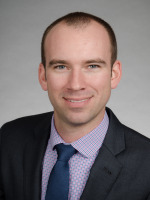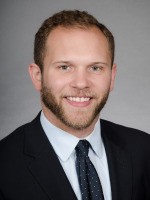The Venture Capital (VC) Fellowship – How MBA students are connecting Foster MBAs and the Seattle VC community
(May 2016 update: When I originally wrote this article in August 2015, I failed to write about the third co-founder: Hartley Riedner, Class of 2016, and a member of the Foster MBA team that won second place at the 2015 Global Venture Capital and Investment Competition. I apologize for this error and got a chance to talk to Hartley last week to hear more about her experience and how the Venture Fellows went. Read about her experience here! – Nelson Tang, Class of 2016)
Meet Ken Horenstein and Rob Skatrud, two first-year MBA students who are partnering with the Buerk Center of Entrepreneurship to start a Venture Capital Fellowship for future Foster MBA students. They met through the Venture Capital and Investment Competition class at UW, which prepares students to compete in the global competition. UW won the Silicon Valley region and placed second in the in world in 2015!
Tell me a little about your background and where you guys want to go after the MBA?
Ken Horenstein: Before the MBA program I was working in finance in the Bay Area for almost 3 years, and Chicago before that. When I was in the bay, I did a Startup Weekend on a whim. Literally signed up that week and did it that weekend. I remember having this moment after the first night of Startup Weekend. It was 11 pm and I was walking home, and had to call and wake up my dad to tell him that this is what I was going to do for the rest of my life. I want to work in small companies, and try to figure out problems in a new way…compared to the old finance paradigm where everything’s solved, and you just need to plug in the numbers and figure it out. So after that day I tried to decide how I was going to facilitate this transition, and that’s when Foster and the MBA sort of presented itself. This great entrepreneurial ecosystem brought me back up to the northwest.
Rob Skatrud: Before school, I worked for a couple of high-growth software companies. After doing that for 8 years, I realized that I had been working really hard to make other people a lot of money, and like Ken I wanted to go back to something a little earlier stage. So for me, coming back to the MBA was a way to network around Seattle’s entrepreneurial environment, and take a step back and find the right fit for me.
How did you guys get to know each other?
Rob: I think we met each other through the Venture Capital and Investment Competition (VCIC) class that was in addition to our core requirements in the Fall. It just happened to be on Thursday nights, so we would wander over to Pub Club right after. I’d say through that we got to know each other pretty well.
Ken: We weren’t on the same team in that class, but since there were only a few first year students in there, we tended to huddle together.
Tell me the problem that you guys are trying to solve? What gave you the idea?
Rob: The one thing that I wanted out of my MBA experience was seeing the deal side of startups. I was deciding between UT-Austin and Foster, and UT has a program called the Venture Fellows. They select a few of the first year students and get them project work with VC firms, Private Equity firms, and Angel investors, so that the students can get first-hand, tangible experience in that space. But I feel that Foster has this great community, too. It’s in the middle of Seattle, which has such a great ecosystem. A lot of the Seattle VCs are already on campus, and we have great relationships with them through the Buerk Center of Entrepreneurship. It seemed that there was a huge opportunity to combine all the different pieces of the puzzle.
Ken: Rob was the one who initially broached the idea and brought up this UT program. So the more that I started to look into that, the more that I thought that it was really viable to do something similar here. It’s funny because neither of us said that we wanted to get into venture capital…both of us want to go on the company side. However, when you become an entrepreneur, you have to know both sides. In addition to the company side, you also have to understand what the investment market wants, and how they invest. Through the VCIC, we were able to meet a lot of people in the area, including prominent angel investors and VCs, and they’re all here on campus. We kept hearing this story that you’re not going to get a job in VC right out of school. We asked ourselves: “if we can’t change this in the immediate future, then what needs to be done in the long term, and what things can we start now that could enable that down the road?” We’re not saying that this program is supposed to get students jobs in VC, rather it’s specifically focused on getting exposure to how the VC industry works and opening those networking doors. We are focusing on what we can we do right now that could remove these barriers and open doors for future students.
Tell me about the VC Fellowship. What will students get out of this? What’s your vision for the future?
Ken: We’ve recruited a pretty great board, and we’re going to reach out to our first set of VCs to describe the program and the different projects that we can do. This fall, we are going to interview and recruit our first class of 3-5 first-year students. They’ll need to complete additional classes like the VCIC course, which is a great intro to what VCs look for and also a great opportunity for initial networking. After getting a strong foundation in the fall quarter, they’ll be placed with a VC for 3-6 months for an opportunity to work on things like market sizing or valuation projects. These projects might be more mundane to a VC, but would be an incredible experience for a first-year MBA to see. They’ll get to see the process first hand and learn how they make decisions.
Rob: To build on the importance of experience, I’ve been doing a self-sourced project this quarter, and it’s been very beneficial. I probably got my internship this summer because I was able to speak to the experience that I got through this project. We see this as a way to get students this experience in their first year, so when they go out and start interviewing for jobs or their summer internships, they’ll already have this experience under their belt.
Ken: It’s very much an educational opportunity, a way to get experiential learning by working on extended projects. The Buerk Center has been tremendous in supporting us and giving us ideas. It’s been important for us to work together with them because there’s so many different programs on campus right now and we don’t want to overlap.
How has the response been with the VCs so far?
Rob: We’ve received really positive responses from the VCs that we’ve talked to so far. At first, Ken and I were really focused on figuring out what the value added is for the VCs. A handful of VCs that I spoke to down in Austin kind of laughed at that. They told us that “you guys are a bunch of MBAs from a top institution, you’re asking for pennies on the dollar to come work…what do you mean by value add?”
What do you hope to get out of this, in terms of your career goals?
Ken: I think for me, this is just like a startup. We started with nothing, just this concept. We verified it with people on both sides of the equation, and confirmed that there is value to all the people involved. And then we had to find the right team that was going to execute on this vision. It’s been a tangible experience, to see what it’s like to start something new, and to get it off the ground and work with all the stakeholders. But we are also thinking about how we want to remember our time at Foster. In 10 years, it would be incredible to look back and know that this Venture Capital Fellowship is in place because we were willing to start it. We were willing to find all these people who shared the same passions, and we were able to put our sweat and work into it and build something that improved the Foster community.
Rob: To take that thought one step further…for me, the benefit is raising the profile of the Foster MBA. I think having this in place is really going to pull a different kind of candidate towards this program, and 5-10 years from now, people are going to look at the brand on both of our resumes and recognize the value that we bring to the table.
How can we help?
Ken: First, we love spreading the idea and talking to people about it, so if they want to get a hold of us we’d love to talk. We would also love opportunities in the corporate venture capital as well. That would increase the types of experiences this program could offer and increase the draw to the student fellows. We want this to be something that any student from any background and any skillset can see this as an opportunity to learn something, no matter what their end goal is.
Rob: I would also like the readers to know that we have a great list of contacts, but we don’t know everyone that could be of benefit to the program. If this fellowship sounds interesting to you, please reach out to Ken or me. We would love to have a conversation.
Ken: We’re also planning on organizing monthly networking and training events. We would love to talk with anyone who’s willing to share insight into life/work as a VC. Whether it’s an informal chat over lunch, or over a glass of wine, that’ll help us open those doors for our fellows.
Thank you so much for your time, I’d love to follow up with you guys in the Winter and see how you are doing.
Rob: Oh, we will be in the weeds this Fall for sure.

] Rob Skatrud, Class of 2016

] Kenneth Horenstein, Class of 2016
